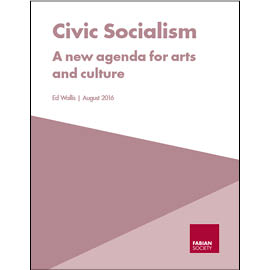Civic Socialism: A new agenda for arts and culture
A rich cultural life in our villages, suburbs, towns and cities can help us make sense of the world around us.

- Civic Socialism
- Ed Wallis
- 12 August 2016
Arts and culture have not been seen as a political priority for many years – and have tended to be regarded as ‘low hanging fruit’ in the search for spending cuts following the financial crisis.
This report, however, argues that arts and culture are actually of critical political importance; and that sustaining them presents a policy challenge that must be urgently addressed. All of Labour’s big election victories have had a strong cultural story: an inspiring, hopeful vision of how social democratic politics can lead to a better life for all. If a political party is unwilling to think about art, creativity and culture then it is closing its ears to the fundamentals of life as it is lived, and denying itself the ability to give voice to it.
But it is clear that cultural life in this country faces very real challenges, as the state withdraws and institutions and services that have relied on public funding seek new ways to survive. While George Osborne’s 2015 autumn statement spared the big national arts institutions from further cuts – a move which the Arts Council chief praised as “an astonishing settlement for arts and culture” – the squeeze on local authorities tightened even further. With cuts of more than 50 per cent to council grants, the temptation to close or restrict access to local arts institutions will only increase.
Civic Socialism: A new agenda for arts and culture argues that the left can develop a powerful new cultural story based around local and regional identity; but it must do so at a time when local culture is facing an unprecedented threat. In contrast to New Labour’s focus on big national institutions, the Labour party must now embed its approach to the arts in the places people live and interweave it with people’s day-to-day experiences. It is not just that funding restraints require this; it is the only way to respond to the rich diversity of our local traditions. As the world gets bigger, more challenging and more complex, our local identities matter more and more. A rich cultural life in our villages, suburbs, towns and cities can help us make sense of the diverse and fast-moving world around us, and enable us to forge the strong social relationships we need to sustain our lives within it.
Labour’s strategy for the arts will be a test of whether the party is capable of a different approach to politics; one that looks beyond its old administrative instincts of centrally-directed tax and spend, towards a more collaborative, plural and decentralised socialism. For our cultural life is far too rich to be run from the centre; but yet it will always need nurturing by public institutions in order to flourish.
Civic Socialism argues that the left must:
- Seize the opportunities presented by devolution to forge a new civic socialism based around local culture and pride of place
- Empower people to take control of their own cultural life in their own communities, establishing a framework for encouraging community involvement in arts institutions and cultural services
- Experiment with new models of running crucial services and institutions that build partnerships across sectors.
Author
Fabian membership
Join the Fabian Society today and help shape the future of the left
You’ll receive the quarterly Fabian Review and at least four reports or pamphlets each year sent to your door
Be a part of the debate at Fabian conferences and events and join one of our network of local Fabian societies
Join the Fabian SocietyBe the first to know
Sign up to the free Fabian Society newsletter
Find out about the latest Fabian Society research, publications and events with our regular updates
Sign up today